Search Results
Search
Filter results
Advanced Filters
Your search returned 89 Solutions
-
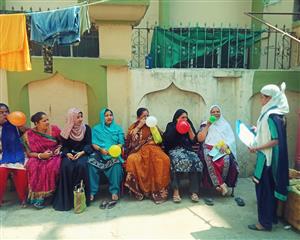
Community-based support services to persons with psychosocial disabilities
‘Seher Urban Community Mental Health and Inclusion’ (UCMHI) is a programme of the Indian Bapu Trust designed to promote independent living for people with psychosocial disabilities residing in urban slum settlements. In 2022 the model has been implemented in additional Indian states.
BAPU TRUST FOR RESEARCH ON MIND AND DISCOURSE, Bapu Trust For Research on Mind & Discourse, India -
Flanders’ Personal Assistance Budget
The most important feature of Flanders´ Personal Assistance Budgets (PAB) is that the person with disabilities (or their representatives) controls both the assistance and the assistance budget, not the assistance provider. A multi-disciplinary team assesses and decides the budget each user receives, depending on his or her support needs.
VAPH - Flemish Agency for Persons with Disabilities, FLEMISH GOVERNMENT DECREE ON THE PROCEDURES FOR GRANTS (PERSONAL ASSISTANCE BUDGET) TO PERSONS WITH DISABILITIES, Belgium -
Empowerment of youth with disabilities involving their families and communities
ETI primarily focuses on young people with visual impairments, offering life-skills training in group and one-to-one settings, parent workshops, and other community activities to promote social inclusion. ETI also works with relief agencies to ensure that young refugees with disabilities can also access its programmes.
ETI - Empowerment Through Integration, Lebanon -
At-home support for parents with intellectual disabilities
Begleitete Elternschaft’ (Accompanied Parenthood ) is a project of MOBILE – Selbstbestimmtes Leben Behinderter e.V. from Germany. Since 2006 eight to twelve parents with intellectual disabilities per year are supported in raising their children at home, assisted by educators in the areas of life skills, teaching, and childcare.
Mobile - Independent Living of Disabled People e.V., Accompanied Parenthood (Begleitete Elternschaft, BE), Germany -
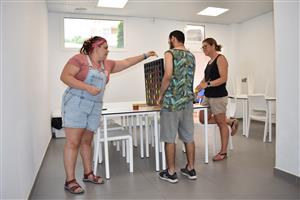
Facility supporting the social integration of people with psychosocial disabilities
‘Espai Obert’ (Open Space) by Support-Girona, Spain, is a community-based service for people with psychosocial disabilities to address their basic needs. The service provides a place for personal hygiene and meals, and does not have strict access rules or require a treatment commitment.
Support Girona, Open Space (Espai Obert), Spain -
Improving access to electoral events
In 2014, New Zealand’s Electoral Commission finalized "Access 2020". This strategy takes the improvements made over the past electoral cycles and embeds them into a longer-term framework. In addition, it provides information and resources in accessible formats and maintains relationships with the disability sector.
Electoral Commission of New Zealand, ACCESS 2020 DISABILITY STRATEGY, New Zealand -
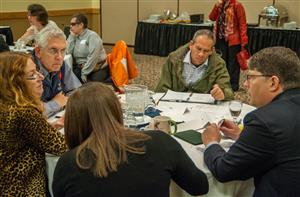
An Accessibility Implementation Plan for Provincial Elections
The plan addresses four problematic areas that had been identified through focus groups and consultations: voting options, polling place accessibility, products and services at polling stations, voter information and public education. Solutions carried out include improved polling place accessibility or homebound voting.
Elections Saskatchewan, Canada -
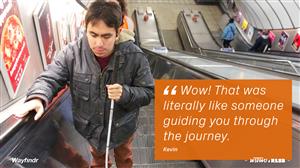
Wayfindr: Empowering vision impaired people to travel independently
Wayfindr wants to establish an Open Standard that helps manufacturers create consistent and reliable wayfinding products. For people with visual impairments, such a standard will enable them to navigate independently by giving them access to reliable, consistent directions from their smartphones and other devices.
Royal Society for Blind Children, United Kingdom -
Providing a university experience for persons with intellectual disabilities
The Inclusive Education Program at the University of Sydney is a pilot providing a university experience for participants in a range of studies of their choice, with students participating in regular lectures and tutorials as well as attending one-on-one tutorials and receiving peer mentoring for added support.
The Centre for Disability Studies, Australia -
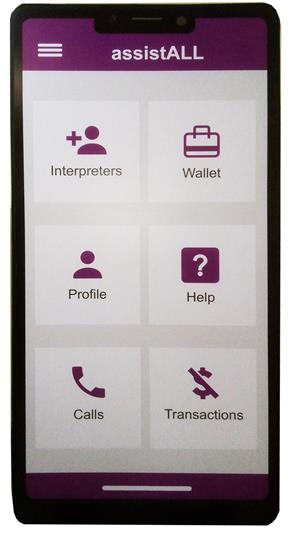
Sign language translation app for accessing services and businesses
Signs Media Kenya is dedicated to education, information, and entertainment in sign language. The social enterprise operates a news channel and has developed ‘2022 assistAll – an app that provides on-demand, 24/7 interpretation services and is available in English as well as Saheli.
Signs Media Kenya Limited, assistALL, Kenya